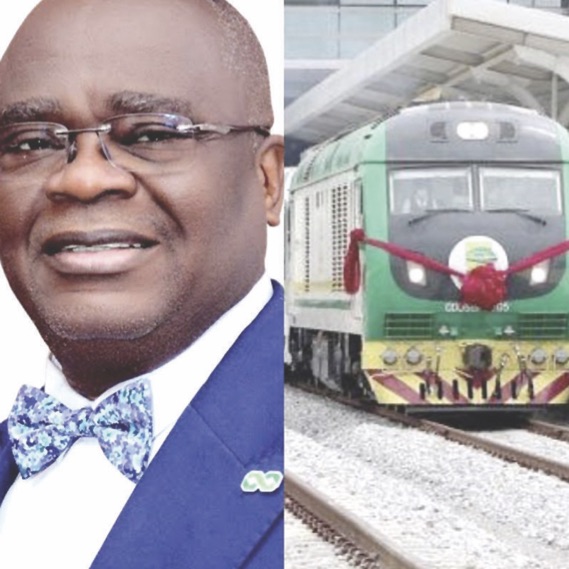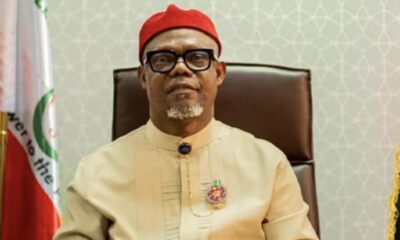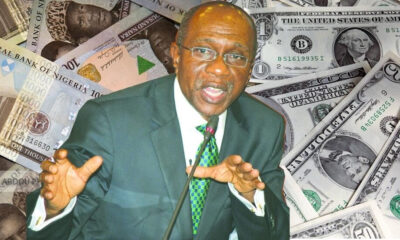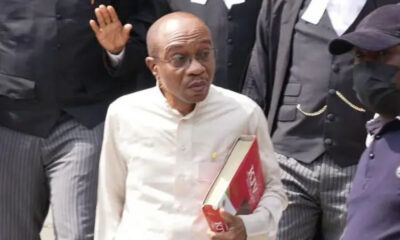Business
CBN’s $7.5 billion loans from US lenders mar Nigeria’s credit rating

The Central Bank of Nigeria (CBN)’s security borrowing from JP Morgan and Goldman Sachs could set Nigeria’s credit rating on a free fall to junk amid efforts to reposition the economy.
The apex bank, in its newly released 2022 financials, reported borrowing $7.5 billion from U.S banks JP Morgan and Goldman Sachs by pledging securities.
Analysts say that the loan deal, which the central bank said was contracted “in exchange for its securities to be held for collateral”, may impair the nation’s fragile fiscal position and credit rating.
The CBN also disclosed that it entered into 30-day forward contracts totalling 3.15 trillion naira in 2022 with undisclosed counterparties.
Sylvester Anaba, an analyst at a Lagos investment house, said there won’t be severe consequences as much as CBN can pay back its debt to these foreign creditors.
“But if they default, then investors will begin to dump our bond. It will also impact our credit rating,” he said.
“Recently, they brought up some ratings and Nigeria was maintained at B-, about six notches down to junk rating. It means by the time CBN defaults; there is nothing that will save us from entering junk.”
READ ALSO:
- Two arrested for raping 11-year-old girl in Imo
- Pastor Bakare attacks APC, Tinubu’s economic policies as anti-people
- We sacked Bazoum to save Niger, Nigeria – Niger Military junta tells Nigerian Muslim clerics +photos
The apex bank disclosure on borrowings of $7 billion and $500 million, respectively, from JP Morgan and Goldman Sachs leaves fragile investor confidence in Nigeria in danger of fresh harm after President Bola Tinubu’s host of currency reforms and termination of a regime of costly fuel subsidies that are already winning international investors back.
Rating agency Fitch last November downgraded Nigeria’s Long-Term Foreign-Currency Issuer Default Rating (IDR) to ‘B-’ from ‘B’, citing “deterioration in Nigeria’s government debt servicing costs and external liquidity despite high oil prices.”
Moody’s earlier verdict
A verdict by New York-based Moody’s Investors Service early this year similarly cut Nigeria’s ratings to non-investment grade in danger to its prospects of sourcing debt from the international capital market.
The then Minister of Finance, Zainab Ahmed, rejected Moody’s position.
“But these are external rating agencies that don’t have the full understanding of what is happening in our domestic environment,” she said in a retort.
S&P Global Ratings
Against the backdrop of recent reforms, S&P Global Ratings earlier in August revised its outlook on Nigeria to stable from negative.
“Nigeria’s newly elected government has moved quickly to implement a series of fiscal and monetary reforms, which we believe will gradually benefit public finances and the balance of payments,” the rating agency said in a statement.
Analysts are worried that the various revelations from the newly released CBN financial reports may reverse the gains of recent months.
An exposure that high without documentation in the country’s public debt books is an early setback to recent measures like the unification of Nigeria’s multiple exchange rates, aimed at stabilising the naira.
Nigeria’s dollar bond due in 2030 sank 2.295 cents to its lowest level in the past one month on Friday at 83.221 cents as a crisis of confidence in the economy heightened among investors.
“We are currently grappling with a confidence crisis in the forex market. This may further worsen the confidence problem. It could aggravate speculative activities,” said Muda Yusuf, the chief executive of the Centre for the Promotion of Private Enterprise.
“Rating agencies are going to begin to revise our ratings. You know what that will do to our reputation as a country,” Dr Yusuf further said.
More Irregularities
CBN books for 2022 showed that $3.2 billion is owed to an unnamed party as foreign currency forward contract payables—no notes providing clarity on the transaction accompanying that item.
READ ALSO:
- ‘It’s time to move on,’ Elon Musk isn’t serious about fighting – Mark Zuckerberg
- I bathed with human skull to get customers for my business -Suspected ritualist
- Travellers stranded as Gombe-Bauchi road caves in
“Since the loans from JP Morgan and Goldman Sachs etc., are collateralised with Nigeria’s foreign assets (securities), then the current gross external reserves of about $30 billion becomes $16.3 billion net,” a prominent economist who sought anonymity told PREMIUM TIMES.
“If the other outstanding obligations are included, CBN is technically insolvent,” he added, noting that the exchange rate is likely to depreciate further.
The analyst remarked that the low levels of the real reserves has encumbered the apex bank’s intervention in the currency market.
The current state of the reserves means investors will rather accept the exchange rate as it is at the moment on the knowledge that the reserves could run dry soon.
“The rush to the exit door will create an fx market stampede,” the analyst said.
The decision of international investors in 2021 to quit the open market operation (OMO) bills denominated in dollars was set to strain the reserves with foreign investment in the bills already at $17 billion a year earlier.
According to the analyst, “it was at this point that CBN took collateralised loans from these banks.”
The immediate past president, the CBN board and the National Assembly failed to bring Godwin Emefiele, the apex bank’s governor, to book in a mark of failure of oversight, making them culpable, he added.
“While they do not have to approve CBN transactions, they did not sanction the Governor for not publishing and gazetting Annual Reports, which would have exposed the scam.
“The entities that lent money to CBN have violated an important international norm: If the law of a country requires published audited accounts, they broke the law by lending to an entity that did not meet the law,” the analyst affirmed.
“The IMF should be asked questions: CBN was given IMF advances in 2020, what Annual Report formed the basis? What safeguards took place before the money was advanced? “Why has IMF Annual Reports since 2016 not pointed out these issues? Can IMF be relied upon as a credible and impartial organisation?” he said.
Opacity
Last year, Premium Times raised concerns over the failure of the apex bank to publish its financial reportsin gross contravention of extant laws.
For years, the Central Bank of Nigeria (CBN) repeatedly failed to release its annual reports showing details of its operations and financial obligations.
Since 2005 when it started publishing details of its annual report on its website, the CBN never failed to publish the report until it stopped the publication of the crucial documents shortly after the Muhammadu Buhari government came to power.
According to the CBN Act 2007, the apex bank is expected to publish its report within two months after the end of each financial year.
“The Bank shall, within two months after the close of each financial year, transmit to the National Assembly and the President a copy of its annual accounts certified by the Auditor,” the CBN Act reads in part.
“A report required to be submitted to the National Assembly and the President shall be published by the Bank in such manner as the Governor may direct.
“The Board shall ensure that accounts submitted pursuant to this section shall, as soon as possible be published in the Gazette.
“The Bank shall, as soon as may be practicable after the last day of each month makeup end, publish a return of its assets and liabilities as at the close of business on that day, or if that day is a holiday, as at the close of business on the last preceding business day,” the Act reads.
Analysts said the failure of the CBN to publish the report sent wrong signals to investors and others interested in understanding the state of the economy and concealed Nigeria’s fiscal problems for far too long. (Premium Times)
Business
CBN Policies, Foreign Inflows Drive Naira to Two-Year Peak

CBN Policies, Foreign Inflows Drive Naira to Two-Year Peak
Nigeria’s naira has extended its recent rally, trading at one of its strongest levels against the U.S. dollar in nearly two years, supported by sustained foreign portfolio inflows, tighter liquidity management, and targeted policy interventions by the monetary authorities.
A macroeconomic update by CardinalStone shows that the local currency has appreciated 6.9 per cent year-to-date at the official foreign exchange market, closing at ₦1,347.78/$—its strongest performance since early 2024. The appreciation reflects improved FX liquidity and growing confidence in the official trading window.
Despite the gains, a gap persists between the official and parallel markets. However, the premium narrowed from about 5.7 per cent to roughly 3.2 per cent following renewed foreign exchange interventions by the Central Bank of Nigeria. According to CardinalStone, the compression of the spread indicates stronger liquidity conditions in the official market, reducing incentives for speculative trading and arbitrage.
As part of efforts to further stabilise the FX market, the CBN recently authorised licensed Bureau de Change (BDC) operators to access foreign exchange from approved dealers at prevailing market rates, subject to a weekly cap of $150,000 per BDC and strict Know-Your-Customer (KYC) requirements. Under the framework, operators must sell unused FX balances within 24 hours, limit cash transactions to 25 per cent of total trades, and settle transactions through licensed financial institutions.
READ ALSO:
- Edo Governor Okpebholo Names Mercy Johnson-Okojie Special Adviser
- Many Feared Dead as Suspected Lakurawa Militants Attack Kebbi Communities
- AMAC Polls Shock: Another PDP Candidate Withdraws from FCT Race, Backs APC
With 82 licensed BDCs currently operating, CardinalStone estimates that potential FX supply to the segment could rise to about $50 million monthly. Although this remains significantly below pre-pandemic levels, the renewed supply has helped ease retail FX demand pressures and compress the premium in the parallel market.
While foreign inflows have strengthened the naira, analysts caution that continued appreciation could prompt profit-taking by offshore investors. CardinalStone estimates outstanding foreign portfolio investment (FPI) exposure at between $12 billion and $14 billion, noting that Nigeria’s carry trade remains one of the most attractive across emerging and frontier markets.
The firm added that assuming many investors entered the market at around ₦1,500/$, a move toward ₦1,200–₦1,250/$ could deliver over 22 per cent FX gains on currency alone. Such gains could heighten the risk of portfolio rebalancing or exits, particularly as political and election-related uncertainties begin to build.
Ahead of the latest meeting of the Monetary Policy Committee, analysts describe the macroeconomic signals facing policymakers as mixed. Inflation has started to moderate, while short-term interest rates have converged near 22 per cent, about 500 basis points below the 27 per cent Monetary Policy Rate (MPR).
However, the CBN has signalled low tolerance for excess liquidity, intensifying Open Market Operations (OMO) issuances and keeping the Standing Deposit Facility (SDF) attractive to absorb surplus funds and prevent renewed inflationary pressure. Analysts also point to concerns around election-related liquidity, which is expected to intensify in the second half of the year, with over 75 per cent of projected 2026 liquidity expected in the first half.
Looking ahead, CardinalStone expects the CBN to hold the policy rate while adjusting the asymmetric corridor to align SDF rates with OMO yields and preserve the attractiveness of naira assets for foreign investors. Forward market indicators suggest a softer currency path later in the year, with the naira projected to trade within a ₦1,350–₦1,450/$ range in 2026, despite the recent rally.
CBN Policies, Foreign Inflows Drive Naira to Two-Year Peak
Railway
Railway track vandalism: Urgent need for laws prohibiting scrap/metal picking to protect critical assets

Railway track vandalism: Urgent need for laws prohibiting scrap/metal picking to protect critical assets
By Onyedikachi Stanley Onovo
The wanton destruction and theft of Nigeria’s railway infrastructure and other critical public assets represent one of the gravest threats to national development and security.
Across the nation—from the Warri-Itakpe line to Abuja-Kaduna, the Eastern and Western Districts, Lagos-Ibadan, and throughout the Northern network—vandals systematically dismantle tracks, steal armoured cables, and pillage essential equipment. This crisis demands an immediate and robust legislative response.
The unending menace
The vandalism is perpetrated by a network of individuals, from local miscreants (“iron condemn”) to organised merchants who purchase and export stolen materials. Security reports and countless arrests underscore the scale of the problem:
In December 2023, a private security firm arrested 13 suspects for vandalising Abuja Mass Transit Rail assets. The suspects were said to be casual workers engaged by a Chinese company working on the railways, but said to have used the opportunity to steal the materials.
On June 2024, The Cable reported that the Nigerian Army arrested 47 suspected rail track vandals in Kaduna State.
In October 2025, police arrested a suspect vandalising railway electrical installations also in Kaduna State.
Radio Nigeria in December 2025 announced the arrest of three persons in Kwara State for vandalizing and stealing Railway clips and nuts in Offa.
In May 2021, TVC reported some individuals, including one Ejike Okeke were apprehended in Enugu with stolen sleepers and tracks.
On the 30th of January 2026 the Nigerian Television Authority reported that the NSCDC, Bauchi State Command arrested five suspects and intercepted a truck carrying vandalized railway tracks.
This relentless assault has plagued successive management of the Nigerian Railway Corporation (NRC), defying conventional counter-strategies.
A transformative leadership initiative
A pivotal shift began under the administration of President Bola Ahmed Tinubu with the appointment of Dr. Kayode Opeifa as Managing Director/CEO of the NRC.
Dr. Opeifa introduced a fundamental paradigm shift by redesignating what was carelessly termed “scrap” as “unserviceable critical national assets.”
This reframing has driven a transformative partnership with experts to manage these assets responsibly. The era of controversial public auctions—which often saw valuable national iron assets disappear, depriving Nigeria of materials for repurposing and industrialisation—is now over.
Today, a systematic process ensures these materials are reused or responsibly processed, with revenue reinvested into the Corporation. This home-grown solution is a commendable breakthrough that proves Nigerians can effectively solve national challenges.
The critical legislative gap: Targeting the market
While the NRC’s internal reforms are laudable, they alone cannot stem the tide. The root enabler of this vandalism is the thriving, unregulated market for stolen metal. To kill the vandal’s incentive, we must eradicate the demand.
Therefore, there is an urgent need for the National Assembly to enact legislation that:
1. Prohibits the buying and selling of any railway materials (serviceable or unserviceable) on the open market.
2. Imposes severe penalties on buyers and merchants of vandalised public assets, effectively targeting the economic drivers of this crime.
3. Mandates stringent federal regulation of all scrap metal dealers nationwide.
THE SCRAP DEALER NEXUS
The opaque operations of scrap dealers are a major concern. Their compounds are often shrouded, hiding the provenance of their materials. This unregulated space fuels not only railway vandalism but also community theft—from iron crossing bars in homes to street lamp holders.
Trailers loaded with questionable materials move freely from cities and expressways to unknown destinations. Without regulating this sector, our fight against vandalism remains superficial.
CONCLUSION
The partnership and innovation under Dr. Opeifa’s leadership at the NRC demonstrate what is possible with commitment and vision.
However, to secure our railways, power installations, and other critical assets, we must complement this institutional resolve with strong, deterrence-based law. Legislation that dismantles the market for stolen public property is not an option; it is a national imperative for Nigeria’s security and industrial future.
*Onyedikachi Stanley Onovo, Ph.D
FCAI, ANIPR
onyedikachionovo1@gmail.com excellentdikachi@yahoo.com
Auto
MOMAN, ALCMAN Partner BKG to Drive Nigeria’s Shift from Auto Imports to Industrial Production

MOMAN, ALCMAN Partner BKG to Drive Nigeria’s Shift from Auto Imports to Industrial Production
In what industry stakeholders view as a decisive move toward industrial rebirth, BKG Exhibitions Limited has entered into a strategic partnership with the Motorcycle Manufacturers Association of Nigeria (MOMAN) and the Automotive Local Content Manufacturers Association of Nigeria (ALCMAN) to accelerate local automotive manufacturing and reduce the country’s heavy reliance on imports.
The alliance, formalised in Lagos, signals a coordinated private-sector effort to reposition Nigeria’s automotive ecosystem from an import-dependent market to a production-driven industrial base capable of delivering value addition, technology transfer, and large-scale employment.
For decades, Nigeria’s automotive sector has been dominated by the importation of fully built vehicles and, more recently, the assembly of semi-knocked-down (SKD) and completely knocked-down (CKD) kits.
While these models generated commercial activity, stakeholders argue they failed to build deep industrial capacity or strengthen indigenous engineering expertise.
The new partnership seeks to change that narrative by transforming trade exhibitions into structured industrial platforms that connect manufacturers with policymakers, institutional buyers, investors, and international technical partners.
A senior executive at BKG Exhibitions said the collaboration represents a deliberate shift in strategy.
“Exhibitions must go beyond passive marketplaces. They must become engines of economic transformation where Nigerian manufacturers secure contracts, attract capital, and demonstrate production competence,” he said, noting that Nigeria already possesses strong demand but lacks a coordinated ecosystem to convert that demand into domestic output.
“Nigeria remains one of Africa’s largest mobility markets, driven by rapid urbanisation, a growing youth population, and expanding last-mile logistics services.
“Motorcycles and tricycles play a critical role in urban transport, agriculture distribution, and the fast-growing delivery economy.
“However, a substantial portion of these vehicles and their components are imported, placing pressure on foreign exchange and limiting domestic industrial growth.”
MOMAN President Rev. Lambert Ekewuba emphasized that strengthening local production would go beyond import substitution.
“When we manufacture locally, we create jobs, retain capital, and build the technical foundation for advanced automotive engineering,” he said.
ALCMAN Chairman, Chief Anselm Ilekuba, stressed the importance of developing a resilient components ecosystem, describing it as the backbone of any successful automotive industry.
“No country becomes an automotive powerhouse without first nurturing strong supplier networks. Nigeria must empower small and medium-scale enterprises producing metal parts, plastics, electrical systems, and other inputs,” he said.
Under the alliance, future exhibitions will feature dedicated pavilions showcasing Nigerian-made components and vehicles, offering manufacturers direct access to government agencies, transport operators, and regional distributors.
Analysts believe such curated exposure could gradually shift procurement patterns toward locally produced alternatives.
Beyond the domestic market, the partnership aims to position Nigeria as a manufacturing hub serving West and Central Africa, leveraging opportunities under the African Continental Free Trade Area (AfCFTA).
Industry leaders say expanding export capacity will depend on strengthening standards, financing mechanisms, and technical capability.
The alliance also plans coordinated advocacy for policies that support localisation, including improved access to financing, reduced duties on industrial machinery, technical training aligned with modern production systems, and procurement frameworks favouring locally manufactured goods.
Economists argue that a revitalised automotive manufacturing base could stimulate growth across steel, petrochemicals, logistics, warehousing, and tooling industries, reinforcing the sector’s role as a catalyst for broader industrialisation.
Coming at a time when Nigeria is intensifying efforts to diversify its economy away from oil dependence, stakeholders say the success of this alliance could mark a turning point — shifting the country from being one of Africa’s largest automotive consumption markets to an emerging centre of production, innovation, and regional trade.
-

 Politics1 day ago
Politics1 day agoPeter Obi Launches ‘Village Boys Movement’ to Rival Tinubu’s City Boys Ahead of 2027
-

 International2 days ago
International2 days agoCanada Opens New Express Entry Draw for Nigerian Workers, Others
-

 News1 day ago
News1 day agoPolice to Arrest TikToker Mirabel After She Recants False Rape Claim
-

 International1 day ago
International1 day agoEpstein, Ex-Israeli PM Named in Alleged Profiteering From Boko Haram Crisis
-

 metro2 days ago
metro2 days agoOsun Awards 55.6km Iwo–Osogbo–Ibadan Road Project to Three Contractors
-

 Politics2 days ago
Politics2 days agoUpdated: Rivers Senator Mpigi Barinada dies at 64
-

 metro2 days ago
metro2 days agoOndo Monarch Killed as Bandits Strike Akure North
-

 Sports2 days ago
Sports2 days agoAdemola Lookman Scores Historic Goal as Atletico Madrid Draw 3–3 With Club Brugge















